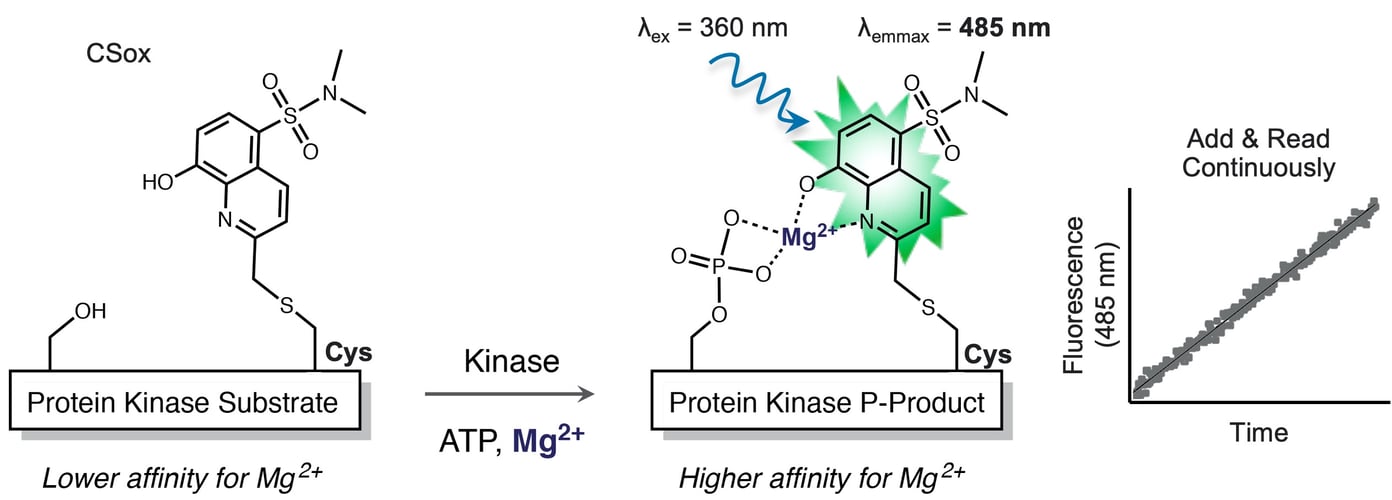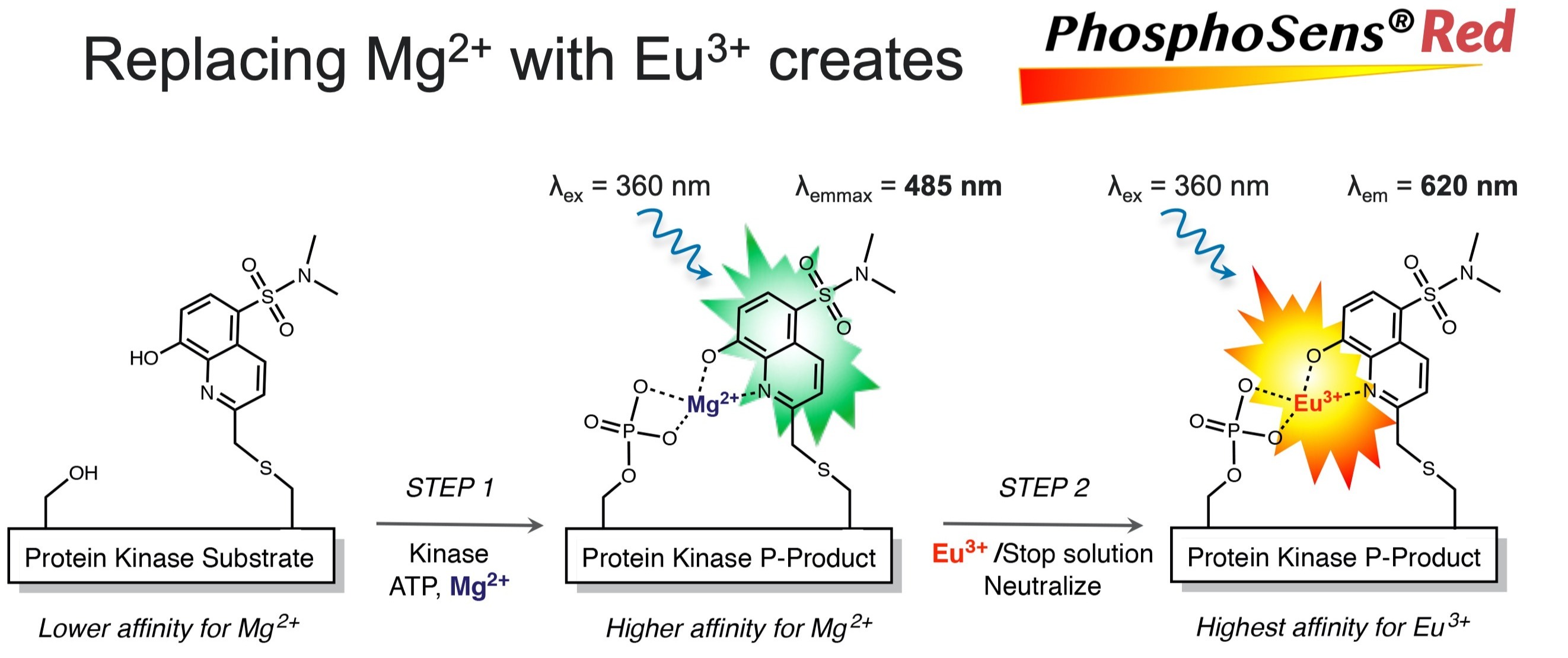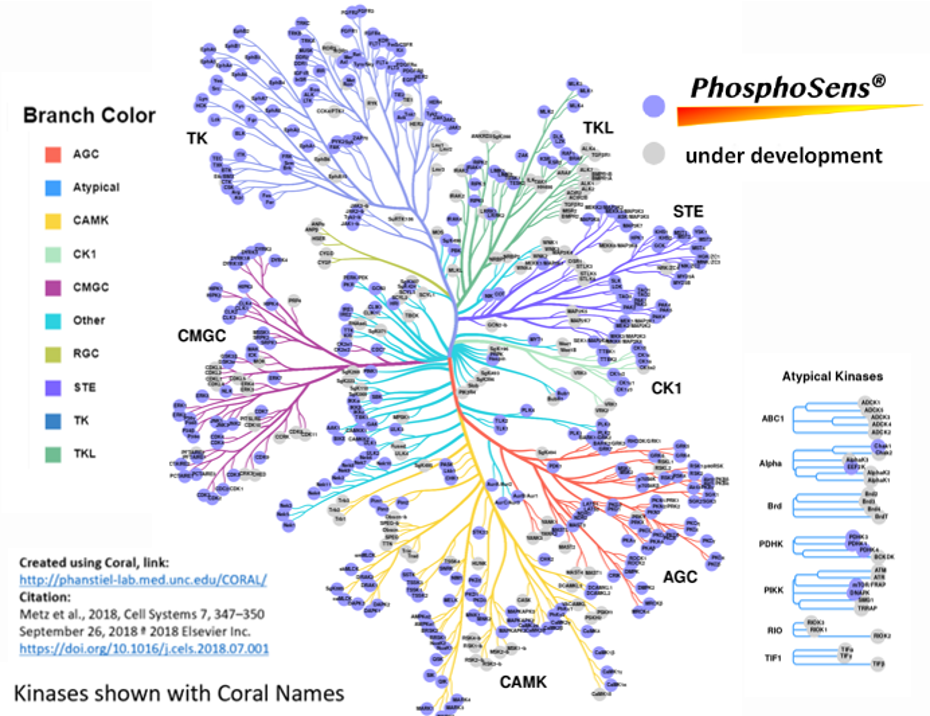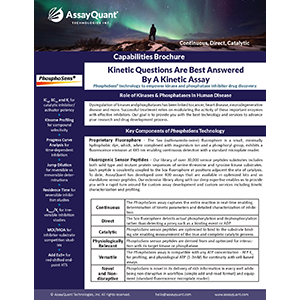Kinase Assays Developed to Deliver Rich Datasets
Designed to meet the demand of your scientific inquiry.
PhosphoSens Technology Offers Robust Continuous, Direct, Catalytic Readouts with Proprietary Sensor Peptide Substrates
AssayQuant's kinetic assays are continuous, by design, enabling direct detection and quantification of kinase activity. Each assay is optimized using our proprietary CSox fluorophore covalently bound to a physiologically derived peptide substrate. PhosphoSens Technology is, at the same time, novel and non-disruptive – delivering a progress curve in every well using a simple add-and-read workflow and standard fluorescence microplate reader. PhosphoSens kinetic assays yield rich datasets, making them an ideal successor to platforms like mobility shift and radioactive assays.
A simple workflow to accelerate your drug discovery and research capabilities. Robust and flexible to fit your scientific needs and research continuum.
Thanks to superior peptide substrates and a small, minimally hydrophobic fluorophore design, the PhosphoSens platform is ideal for today's research. The simple add-and-read workflow produces highly quantitative data, fit to three applications: PhosphoSens-Kinetic, PhosphoSens-Red and PhosphoSens-Lysate for kinetic, end-point and crude cell/tissue lysate respectively.
In the kinetic format, the actual catalytic event of phosphorylation generates the fluorescence signal which is measured in real-time capturing the complete progress curve for every condition with no additional handling. For the end-point format, simply add Europium to the kinetic assay at any point during the progress curve to yield a red-shifted, time-resolved assay to enable correction for compound auto-fluorescence and batch mode processing for high throughput applications.
PhosphoSens-Kinetic is ideal for Profiling, Potency & MOI/MOA. PhosphoSens-Lysate works the same as kinetic but is designed for crude cell or tissue lysates.


PhosphoSens-Red (End-Point) is ideal for high volumes of tests for HTS.
♦ IC50, EC50 and Ki for catalytic inhibitor/activator potency ♦ Kinome Profiling for compound selectivity ♦ Progress Curve Analysis for time-dependent inhibition ♦ Jump Dilution for reversible vs irreversible determinations ♦ Residence Time for reversible inhibition studies ♦ kinact/KI for irreversible inhibition studies ♦ MOI/MOA for inhibitor-substrate competition studies ♦ Add Eu3+ for red-shifted endpoint HTS ♦
WATCH NOW: Leveraging Continuous Fluorogenic Assays for Kinase & Phosphatase Activity to Enable Drug Development
Watch as our President, CEO & CSO, Erik Schaefer, Ph.D., goes into detail about the science behind our PhosphoSens Technology. Learn how our kinetic assays can enable your science by minimizing your time and maximizing your throughput with one technology in two-fit-for-purpose formats. AssayQuant has developed 368 protein kinase assays of the 518 protein kinases. As we continually add more, please refer to our Assay List for the latest information.
Erik has over 25 years of experience at leading Life Science tool companies including Promega, Invitrogen/Life Technologies, EMD-Merck-Millipore and Thermo Fisher Scientific, where he integrated innovative technologies to accelerate discovery and drug development. His expertise is in elucidating the role of protein kinases and phosphatases in normal and disease states, and building workflow solutions to enable these efforts.
Kinome Profiling Services Optimized for Precision and Versatility to Address Your Research Challenges
At AssayQuant, we stand with you on the frontier of drug discovery and target biology. Our technology empowers you with dense data sets, enabling you to rapidly rank candidates by selectivity and potency.
Your drug discovery goals and challenges are ever-evolving. AssayQuant’s kinase profiling services exist to accelerate your deep understanding of your compounds’ specificity, potency and mode of inhibition (MOI). Our Profiling Services are powered by PhosphoSens Technology, in which the catalytic event of phosphorylation is directly quantified continuously, yielding a progress curve in every well.
PhosphoSens Technology, an industry-leading kinase panel (nearly 400 and growing), automation, compound management and detailed enzymological data analysis come together to form unsurpassed profiling services enabling rapid determination of kinome-wide compound potency, selectivity, and MOI.
Achieve Better Cellular Correlation With Our Profiling Services
- Physiological ATP, Mg2+, Mn2+ and Ca2+ concentrations
- Biologically relevant peptide substrate sequences
- Compatible with the incorporation of activators and cofactors
ATP concentration greatly affects the determination of kinase inhibitory activity. We appreciate that the ability to vary ATP concentrations is essential for determining inhibitor mechanisms which is why we offer our profiling at both high and low ATP concentrations making it incredibly versatile.
The Value of Biochemical Screening With 1 mM ATP
- Mimics cellular levels to highlight kinases affected by Km differentials
- Brings ATP’s hydrotropic properties to kinases in solution (improved function)
- May serve as an allosteric regulator
- Raises ATP/ADP ratio to avoid product inhibition and negative feedback
The Value of Biochemical Screening With ATP Concentrations at Km
- Reveals affinity approximations independent of compound MOI
- Most robust binding selectivity information across kinome panel
- Maximize inhibition and assess target-scaffold reactivity



